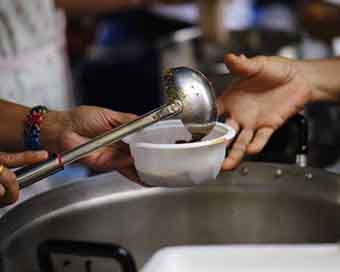Gallery
 PM Modi visit USA
PM Modi visit USA Only the mirror in my washroom and phone gallery see the crazy me : Sara Khan
Only the mirror in my washroom and phone gallery see the crazy me : Sara Khan Karnataka rain fury: Photos of flooded streets, uprooted trees
Karnataka rain fury: Photos of flooded streets, uprooted trees Cannes 2022: Deepika Padukone stuns at the French Riviera in Sabyasachi outfit
Cannes 2022: Deepika Padukone stuns at the French Riviera in Sabyasachi outfit Ranbir Kapoor And Alia Bhatt's Wedding Pics - Sealed With A Kiss
Ranbir Kapoor And Alia Bhatt's Wedding Pics - Sealed With A Kiss Oscars 2022: Every Academy Award Winner
Oscars 2022: Every Academy Award Winner Shane Warne (1969-2022): Australian cricket legend's life in pictures
Shane Warne (1969-2022): Australian cricket legend's life in pictures Photos: What Russia's invasion of Ukraine looks like on the ground
Photos: What Russia's invasion of Ukraine looks like on the ground Lata Mangeshkar (1929-2022): A pictorial tribute to the 'Nightingale of India'
Lata Mangeshkar (1929-2022): A pictorial tribute to the 'Nightingale of India' PM Modi unveils 216-feet tall Statue of Equality in Hyderabad (PHOTOS)
PM Modi unveils 216-feet tall Statue of Equality in Hyderabad (PHOTOS)The Badminton Association of India (BAI) has announced a 14-member-strong India squad for
- Men’s Sr Hockey Nationals to be played in division-based format from April 4
- Mensik denies Djokovic 100th title in Miami final
- KIPG: Son of a vegetable vendor, Bihar’s Jhandu Kumar eyes Worlds, 2028 Paralympics
- Hardik Singh credits hard work and team unity for receiving HI Midfielder of the Year award
- Djokovic, Alcaraz land in same half of Miami draw
90% Indian women ate less during Covid-19 lockdown: Study Last Updated : 29 Jul 2021 01:32:28 PM IST 
Nine out of 10 women in India had less food, impacting their nutrition levels, during the 2020 nationwide lockdown imposed in response to the Covid-19 pandemic, according to a new study.
Researchers from the Tata-Cornell Institute for Agriculture and Nutrition, analysed surveys of food expenditures, dietary diversity and other nutrition indicators at the national, state and district levels in the states of Uttar Pradesh, Bihar and Odisha.Nearly 90 per cent of survey respondents reported having less food, while 95 per cent said they consumed fewer types of food.Most concerningly, the drop was due to decreased consumption of foods like meats, eggs, vegetables and fruits, which are rich in micronutrients that are crucial to good health and development.The study, published in the journal Economia Politica, indicated a decline in household food expenditures and women's dietary diversity in May 2020 compared to May 2019."Women's diets were lacking in diverse foods even before the pandemic, but Covid-19 has further exacerbated the situation," said Soumya Gupta, a research economist at TCI."Any policies addressing the impact of the pandemic on nutritional outcomes must do so through a gendered lens that reflects the specific, and often persistent, vulnerabilities faced by women," she added.The national lockdown to slow down the spread of Covid was in force from March 24 to May 30, 2020.Disruptions to agricultural supply chains subsequently led to price fluctuations, especially for non-staple foods, in less developed districts.The surveys also suggest a decrease in the quantity and quality of nutritious foods consumed by women during the pandemic. For example, some women said that during the lockdown they halved the amount of dal, or red lentils, that they prepared, or that they prepared thinner dals.The unequal burden on women was also caused in part due to the closure of India's aanganwadi centers during the lockdown, affecting 72 per cent of households, the researchers said.The centers, which provide take-home rations and hot cooked meals to nursing and expecting mothers, are an important source of nutrition for women and children."Due to the spillover effects of maternal malnutrition, that risk poses a threat not only to women's productivity and well-being, but also that of their children," Gupta noted.IANS New Delhi For Latest Updates Please-
Join us on
Follow us on








172.31.16.186







